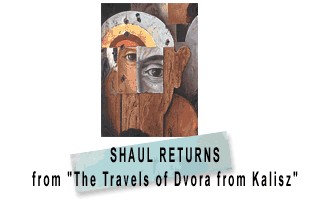 |
Why
is your clothing red, your garments like
those of one who treads the winepress? (Isaiah 63:2) |
This
selection, like the previous, is taken from the narrative "The Travels
of Dvora from Kalisz and Letters to Nowhere." Here Shaul describes
the Aktion military operation in which the children were arrested and
transported to the places of killing.
"This
is the story of the Aktion [1]
against the children, which Shaul wrote down in his journal as an everlasting
memorial: Before nightfall representatives of the Jewish council went
from house to house, wherever there were any children living, to give
them the good news that there was to be a summer camp for the children.
The German authorities were disposed to make a gesture of goodwill toward
the working ghetto, and the children of the privileged workers, who
were forced to do hard work at military camps, would take precedence.
The (Jewish) commander gave orders for all the Jewish children under
the age of fourteen to be listed, so that he personally could try to
make sure there would be no favoritism.
And
Sonia Soltanek had three children. Alyosha, aged eight, and Moreleh
and Minaleh, aged five, twins. And
she dressed them in the finest clothes they had left, which she washed
and patched, and she tied a blue ribbon round Minaleh's neck, and her
mother-in-law helped her and stuffed a few homemade sweets in their
pockets, for they were expressly forbidden to take with them any real
food. Everyone should take just a towel and a piece of soap, and a comb
as well, anyone who had one. For there were no shops in the ghetto for
the sale of such common things, and a comb without teeth was like a
man without teeth; there was no remedy in the ghetto. And the Soltaneks
had been clever enough to preserve secretly some necessary things from
their previous stock, including combs. Anyone likely to be deported
to some unknown place should make sure he has a comb, bread, and clothing.
Combs, especially fine-toothed combs, are very good for getting rid
of lice, and there is nothing more vital, for lice and exile can drive
a man out of his mind, God forbid. That night the mother could not sleep,
and in the morning she said, "I'll send the twins and keep Alyosha
at home."
The
police said, "No, we have orders to take them all."
She
told them, "The older boy will come next time." But they would
not listen.
And
she spoke to this officer and that, and they refused.
Since
the police were beginning to urge them to get moving, and even brandishing
their clubs, the children started wailing. A suspicion, which had not
occurred to the adults, was becoming clear, apparently, to the children.
It is written, "from the mouths of infants . . . You have found
strength,"[2] including the
strength to fear for the future.
The
commander saw that there was quite a turmoil, great hysteria among the
band of children, and before long it would affect everyone else. He
gave permission for the mothers to go with their children, to accompany
them as far as the railway station, for the summer camp was to take
place outside the town at a resort in a pine forest. And he did not
give permission to the fathers. After all, the men had to do their day's
work and provide something in return for the board and lodging that
their children would receive. So the men left.
And
Sonia escorted her children. She held Minaleh with her right hand and
Moreleh with her left hand, and Alyosha went in front, carrying the
towels and soap for all three. And the Jewish children who went out
the gates of the ghetto that day numbered two thousand, boys and girls,
well scrubbed and looking good, even in their rags. In a long, long
line they marched in the road beside the pavement, for, as is well known,
pavements were forbidden to Jews, reserved for the exclusive use of
pure Aryan feet. As they passed through the busy streets of the town,
which they had not seen for many days, they looked around them in amazement,
almost open-mouthed-they had forgotten there were things as shops and
display windows and decorated horses harnessed to carts-and the passersby
also looked at the Jewish children with surprise, as though they had
never seen such creatures before.
A few
old women made the sign of the cross, and hurried unsteadily down the
street. And the column of children did not go through the main gate
of the railway station, but were taken to a siding, far from the eyes
of the curious, and the mothers were told to go no further.
 |
[1]
AKTION: Military operation. In the life pattern of the ghetto
the Aktion was a term for hostile activity by the Germans: arrests,
deportations, and transport to the places of killing. [back]
[2]
"From the mouths of infants and sucklings You have found
strength on account of Your foes, to put an end to enemy and avenger."
(Psalms 8:3) [back]
|
SCROLLS
Introduction
|



